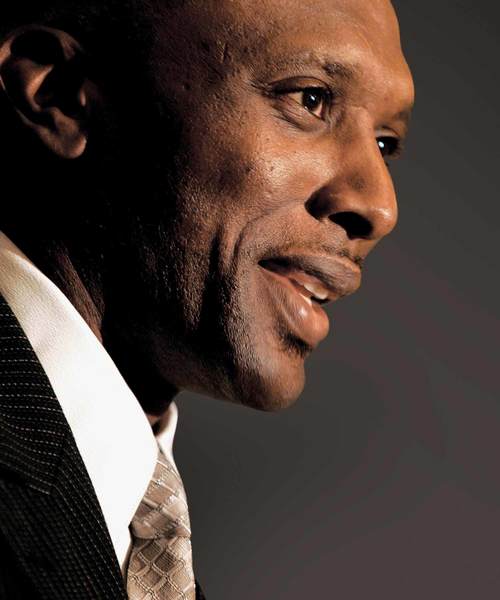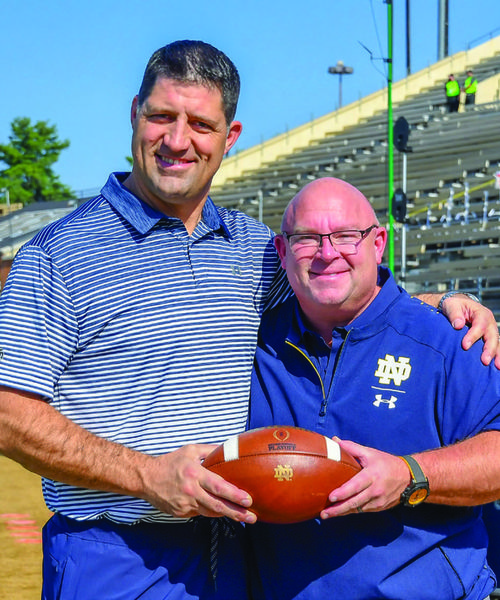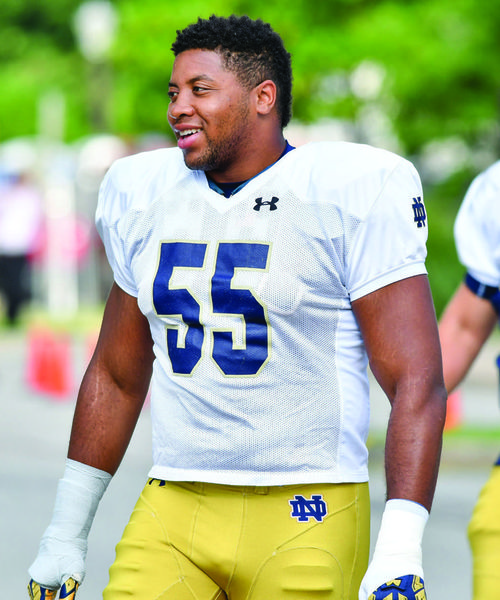
Tim Brown
Raider role model
Pro football Hall of Famer Howie Long was a commanding presence on the football field for the Los Angeles raiders.
Off the field as well.
It was late in the 1993 NFL season and Long strolled into the locker room at the Raiders practice facility in El Segundo, California, over the lunch hour, bellowing, “Tim Brown … Tim Brown. Where’s Tim Brown?”
“He had that big, booming voice and I didn’t know what the problem was,” Brown said. “But he got me in the corner by my locker and says to me, ‘Hey, I’m getting ready to retire after this year and I want you to take over for me.’”
It was an unusual request. Long played defense, Brown offense.
“I had no clue what he was talking about,” Brown said, “but I figured the smart thing to say at that point was, ‘Yes.’”
It turns out Long wasn’t talking football. That short conversation became a life-changing moment for Brown. He had already achieved the heights on the football field, capturing a Heisman Trophy at Notre Dame and Pro Bowl acclaim with the Raiders for his abilities as a receiver. But his new focus off the field would be that as a giver.
Long wanted Brown to take his place as a spokesman for the Athletes & Entertainers for Kids (AEFK) outreach program. Long had founded the group along with former USC assistant athletic director Elise Kim in 1986 with a mission statement of helping disadvantaged youth, who lack positive role models and guidance, through mentorship activities.
For those to whom much has been given in life, much is expected. Much had been given Tim Brown in life. And it was his time to start giving back. Life’s priorities instantly moved to Brown’s front burner.
“Once I got to the league, I wanted to go back and work with kids who did not have a male role model in the house,” Brown said. “I realized how fortunate I was having my father, my brother, my uncle, who was a pastor, and my grandfather, who was a preacher. The coaches that I had … there were a lot of good men around me. I felt this was something I was called to do.”
Brown has spent his football career playing with teammates from single-parent families. He was blessed in life and knew it. His was a two-parent home, and the presence of strong adults in his life taught him right from wrong and made him understand that for every decision there is a consequence. His experience as one of the most recruited high school players in the nation underscored that education.
“I was super fortunate to have people around me,” Brown said. “If I didn’t have my mom and dad and brother when I was going through recruiting, there’s no doubt in my mind I’d have made the wrong decision. When you’re 16-17 and you’ve been told things by grown men … how are you supposed to know it’s not the truth or not the right way? I’d have taken the money and run. You’re talking about $1,700 a month, a car, this and that, a new house for your momma, your girlfriend coming … sign me up for that program. I’m in, Coach.
“But you have to have courage to make the right decisions. When no one is watching, what are you doing? If what you’re doing is something you want no one else to know, you need to work on yourself. That’s one thing we talk about. It’s really hard to talk to a grown man and try to change him, change his ways. A man is used to doing what he’s doing. A woman is used to what she’s doing. For them to change their ways means they must look at what they’ve done in the past and acknowledge it’s wrong. That’s very difficult to do, even if they know they did wrong. That’s why so many people hang on to drugs.
“So you have to get them young. Whatever they’ve been through, they haven’t been through it too long. Get them to understand. Some of their situations are so rough. They’ve dealt with so much and been put down so many times that they just want to shut down to the world. They say, ‘Nobody cares about me, so I’m going to do what I want. I’m not going to do school.’ The beautiful thing for us is we’ve been able to break through some of those barriers. Every time I get up to speak, my prayer to myself privately is, ‘Lord, let me reach one. Let one kid here hear me today.’”
Brown became AEFK national chairman in 1995. That same year he also became the spokesperson for 9-1-1 for Kids, another program founded by Long.
“The state of California was having a problem,” Brown said. “Kids were calling 9-1-1 when a cat went up the tree or when the water hose busted. The state was losing a whole bunch of money with these calls. This program, which is now in all of the California schools, educates the kids to 9-1-1. They’ve seen a decrease over the years with the implementation of this program. Now we’ve served over five million kids with this program nationally.”
Brown attended his initial fundraiser for 9-1-1 for Kids in 1994, a miniature golf tournament. The next year, Brown put his name on the 9-1-1 Celebrity Golf Classic. The tournament enters its 22nd year in 2016 and money raised covers the annual budget of 9-1-1 for Kids.
“But it’s more awareness than it is the money,” Brown said. “This year a mom went into preterm labor and fell on the floor. The 9-year-old daughter called, talking in English to the 9-1-1 operator and Spanish to her mom, going back and forth, providing all the pertinent information. Mom wound up having a healthy child. Who knows what would have happened if that child didn’t know 9-1-1? There could have been a problem.
“There’s a high percentage of kids who are left with their grandmother or grandparents on a regular basis. That was another area we wanted to tap into. My kids could be in that situation with my wife’s mother. It’s important for them to know how to dial 9-1-1.”
Brown also established a mentorship minicamp for fatherless boys in 1999. It pairs a child with a California Highway Patrol or another first responder, who serve as mentors/dads. The week-long camp initially was conducted at the Raiders’ facility but moved to Sacramento after Brown retired from the NFL. Hundreds of kids attend the camp annually.
“That event is super special for me,” Brown said, “because it’s the one event I literally get to rub my hands over some kid’s head and really talk to him like he’s a grown man and try to get him to understand, ‘Don’t feel sorry for where you are. You have a chance to change it, so change it.’ That just means you have to work harder. That’s the name of the game. The harder you work, the better person you’ll be.”
Brown retired from the NFL after the 2004 season and returned to his home state of Texas. He remained active in his California nonprofits but raised his profile in his hometown of Dallas. Brown teamed with Everson Walls, another former Pro Bowler, and Michael Davis, a former Canadian Football League player, to form the Ethos Education Group, a character development program for youth.
Ethos, which is Greek for “character,” targets troubled youths, and the three former football players have spent a good deal of time in recent years with the Winfree Academy Charter Schools. There are six such schools in the Dallas area for kids ranging in ages from 13 to 29 trying to achieve their GEDs. They are kids who have been unable to succeed in conventional public schools for a variety of reasons.
“We’ll go in and take a word like courage or fortitude,” Brown said. “Everson and I will draw a story from our lives and talk about that. We don’t talk down to the kids. We tell them, ‘I don’t care what you’ve been through. The fact of the matter is you’re still here. And you have a chance to change your life. You can sit here and point a finger at people for the rest of your life. And it may be legitimate. But the fact of the matter is you’re sitting in this class right now, you’re not handcuffed, no one’s looking over your shoulder … so you still have a chance to do something with your life. Until you take control of it, you’re going to be in this have-pity-on-me situation.’
“Because we talk so real with them, the program has been very successful.”
Ethos also has spent time with football teams, high schools and middle schools. The earlier the age, says Brown, the better.
“We were told it’s best to get these kids in middle school because by the time they get to high school they’ve already set their path,” Brown said. “There’s data out there that says if a kid struggles in math and English, by the time he’s 10 years old, the state of Texas is building prison cells for him. If you don’t have it down by 8 or 9, the next 10 years you fall through the cracks. Those kids that struggle at that age have a 90 percent chance of dropping out of high schools.”
Brown estimates he makes 35-40 appearances per year for nonprofits. In addition to California and Texas, Brown has been involved with nonprofits in Arizona, Florida and Indiana. He usually wraps a return visit to the Notre Dame campus around a visit to Five Star Life, another program for youth character and leadership development in nearby Elkhart, Indiana.
“What makes Five Star a really special program is that you’re introducing kids to God, some of them for the first time,” said Brown, who is deeply religious and doesn’t smoke, drink or swear. “If for no other reason than to give them a sense of hope that they have somebody looking after them. They just have to go and do the right thing.
“I told them my story, where I came from, and the most important part of my upbringing was that I was made to go to church. When I left home, I didn’t have Mommy and Daddy with me any more. There was no one looking over my shoulder. So whatever I did, it was on me. Just consciously knowing that God was always watching me … I wish I could say I was perfect, but God knows that wasn’t the case.”
Brown anticipates his number of nonprofit appearances increasing in 2016. His enshrinement in the Pro Football Hall of Fame has raised his profile. When you don that gold blazer, you become a voice in demand.
Brown has one demand himself, as Rick Bowles found out this fall. Bowles is the executive director of the Dallas chapter of the Fellowship of Christian Athletes. He wanted Brown involved with the FCA.
“Rick told me, ‘Tim, I need you. What can you do? What will you do?’” recalled Brown of the conversation. “I said, ‘Put me in a room with some kids. Whatever that means. You make up the program. Football players, girls’ volleyball players … it doesn’t matter.’
“Just put me in a room with kids. If I can serve you in that way, then I’m all in. Anything else means it’s going to be a job for me. Then you’re going to have to pay me. And I don’t know if you can afford me now because I’ve got ‘Hall of Fame’ by my name.”
The Pro Football Hall of Fame was a long time coming for Brown. Even though he ranks fifth in NFL history in receptions, sixth in receiving yards and 17th in career touchdowns, Brown had to burn through six years of his eligibility before he was finally voted into Canton.
But in Kim’s eyes, Brown became a Hall of Famer the moment he volunteered his services for those not as fortunate in life as him.
“Tim’s God-given athletic talent, teamed with discipline, tenacity and dedication—and tempered with exemplary humility—has laid the foundation for great success in all aspects of his life,” Kim said. “Tim’s exemplary leadership and genuine concern for others make him the ideal spokesperson for charitable causes. He has a heart to help and truly desires to help make a difference and be a catalyst for positive change.”

